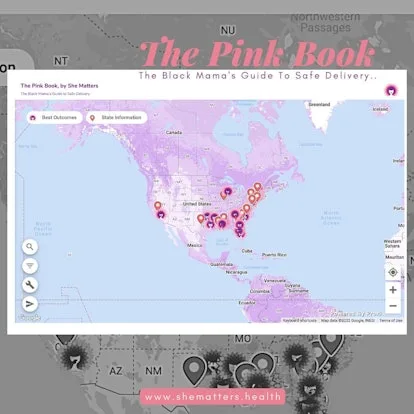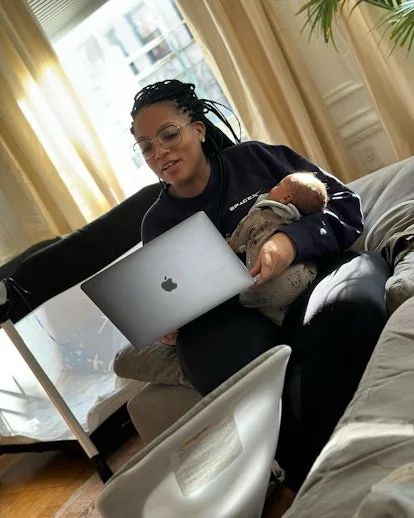The state of Black women and health care is dire, and we can’t look into the future without looking at the past. One of the most well-documented atrocities against Black women in health care belongs to the “Father of Gynecology,” J. Marion Sim, an Alabama surgeon who performed experimental operations on Black slave women between 1845 and 1849 without anesthesia because he didn’t believe Black people experienced pain like white people. It is a belief studies find is still held by many doctors today. This raises the question: In this present day and age, why do Black women still have the highest maternal mortality rate in the United States, which is almost three times the rate for white women? Jade Kearney, co-founder and CEO of digital health platform She Matters, has some thoughts.
“These statistics are at an all-time high because the health care industry refuses to acknowledge research that states systemic racism and lack of social services are the biggest factors,” she tells TZR. She notes that some health care providers have never had a conversation with a Black woman outside of their office. This isn’t all that hard to believe, given recent studies that found that U.S. neighborhoods are more segregated than a generation ago, which can fuel the lack of empathy and understanding of anyone outside of your bubble.
“How do you build empathy for people you don’t know?” Kearney asks. It is a question that deserves a thoughtful, introspective look. “[Health care providers] don’t understand our volatile relationship with this country and health care, and they don’t acknowledge the fear both Black women and health providers have when encountering each other.”
With She Matters, Kearney aims to stop this vicious cycle in its tracks, reshaping the health care system’s reactive approach into a more proactive one by curating a culturally competent certification program that focuses on educating providers on everything from how to communicate thoughtfully with Black patients to the history of systemic racism in health care and how that history impacts the now. “The reactive approach is ‘there’s now a Black woman in the emergency room dying. What do we [health care providers] do?’” Kearney shares. “What are [health care providers] doing to be proactive where they are because it’s not Black women’s jobs to become doctors [in order] to have babies safely.”
She Matters’ Origin Story
Kearney’s passion for Black women’s experience in the health care sector comes from a personal lens. “In my past life, before kids, I was a nomadic educator,” she tells TZR. “I had issues with anxiety, but I was able to manage it holistically.” Kearney used acupuncture, travel, and spa days with friends as a remedy, but after the birth of her first daughter, she realized she needed more targeted tools.
“The coping skills that I established were not working, and I had terrible postpartum anxiety OCD,” she shares. “I was anxious about harming my daughter.” Kearney explains that what she experienced was debilitating. “I just felt like I was losing my mind.”
As Kearney struggled, she reached out to her mother, who shared that she, too, had dealt with postpartum depression after giving birth to the founder’s brother, noting she felt more like herself after about six months. Her advice to her daughter: “You’ll be fine. You need your job. Go back to work. Black women don’t have time for postpartum.”
To an outsider, that advice might seem harsh. But Black women in the U.S. are paid 36% less than white men and 12% less than white women, so the sense of urgency to get back to work is always top of mind. With that advice, Kearney says she contacted her gynecologist, who prescribed Zoloft, echoing her mother’s advice: “You’ll be fine.” But she still wasn’t fine. In fact, she says, she felt neglected by her health care providers, who not only prescribed her Zoloft without asking in-depth questions about her mental health and day-to-day struggles but didn’t check in even after Kearney neglected to pick up her prescription.
So instead of relying on her gynecologist to help, Kearney sought out a Black psychiatrist, who prescribed her a treatment — Luvox — to better address her postpartum OCD. Unlike Zoloft, which is a selective serotonin reuptake inhibitor (SSRI) typically prescribed to address depression, anxiety, and panic disorder, Luvox is an SSRI that best treats obsessive-compulsive disorder (OCD). What Kearney needed in that moment was someone who heard her specific issues and could offer her a more customized solution based on said issues.
“This is why what we do at She Matters with our Cultural Competence Certification Program is so important,” says Kearney. The startup’s program offers a comprehensive training and support initiative designed to improve the health outcomes for Black women who experience postpartum complications — a point of reference Kearney’s Black psychiatrist already shared.
“She understood the cultural nuances around me taking medication,” Kearney tells us. Additionally, she took the time to discuss possible side effects while validating Kearney’s fear of taking medication. “We really worked together,” she says fondly. “I met with her for a year, every month, and talked about how I was feeling.”
Kearney attributes adding medication to her postpartum treatment to helping her time in therapy to be successful. “I do not know if we would be as far with She Matters if I did not take that medication,” she tells us. “It’s not just about the medication. It is about the provider being culturally competent, especially during that postpartum period for Black women because of the distrust [of the health care system].”
Building She Matters
With her personal experience and passion for Black women lighting her fire, building She Matters is still not easy. “I did not have immediate support from my family,” she recalls. “Airing out personal instances of struggle isn’t really part of the culture.” But she found support in her best friend and ex-boss, Marguerite Pierce, with whom she co-founded She Matters. Despite the initial discouragement, Kearney says she approached the new venture with no fear.
“I was silent for so long that I was ready to share my story, let go of the shame, and help other Black mamas heal,” says Kearney. This vulnerability component was especially important because of the all-too-familiar stigma Black women share around mental health, which can include strong feelings of shame and denial that are often linked back to the “strong Black woman” trope. Because of this, She Matters’ ethos works twofold, according to Kearney: “accountability and validation.”
In addition to the Cultural Competence Certification Program as a means to combat these deep-rooted systemic issues, there’s also the organization’s Pink Book. “The Pink Book was created to pay homage to the ‘Green Book,’ a guide Black folks used to navigate through the Jim Crow South safely. The Pink Book does that for Black mothers,” Kearney explains. Indeed, the resource offers an interactive map listing the safest hospitals across 14 states with the largest African-American populations in the United States. All of the data was collected by institutional researchers and cross-checked via CDC and U.S. News. Kearney explains that building this list proved to be a challenge for her and her team. “It [was] sad to see how many hospitals aren’t considered ‘safe’ for us to give birth in or safe to be treated equally in.”




One more component to the She Matters model: Black doulas. “Black doulas are important and can be the difference between life and death,” Kearney tells us. “They advocate for the mother and child in the delivery room and give the mother a voice.” She Matters connects mothers up to three months postpartum with a doula for free. However, the demand is high. “There’s been times when we have over 4,000 moms on the waitlist.”
The Challenges Of Change
For Black women — who are the fastest-growing group of entrepreneurs — the hurdles to building a sustainable business are plentiful due to lack of support, burnout, and gaining access to capital. For example, a Goldman Sachs study found Black women business owners who apply for funding are rejected at three times the rate of their white counterparts. “This has been the hardest thing I have ever done in my life outside of securing my mental health,” Kearney tells us with a long exhale. “I have encountered so much sexism and racism in trying to obtain venture capital [to build She Matters].”
Playing the centuries-old game of raising capital was causing the entrepreneur an excessive amount of stress, so much so that her hair was falling out. So, these days, Kearney is working to carve out creative solutions to raise funds and, as she puts it, “create impactful change for Black women [in startup culture].” She knows this will be a slow path filled with lots of learning.
However, she says there’s an essential pain point that often hurts Black female founders, and she wants it on the record and addressed. “A lot of people in this industry teach us how to raise [capital],” Kearney tells TZR. “They do not teach us how to get revenue, and it sets us up for failure because if you continue to raise, you dwindle the ownership you have within your company.”
While the challenges of launching a new business can certainly be overwhelming, Kearney’s initial mission keeps things in perspective, as well as the fire in her belly. “When a doctor called me to tell me that the Cultural Competence Certification Program made him feel like a better provider [and the mother he was caring for] said it was her best birthing experience. On those hard startup [and] entrepreneur days, that is what makes it all worth it,” she shares. “Real change.”


